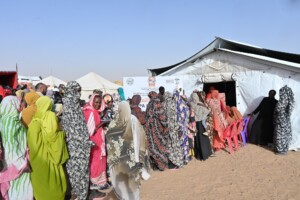Nearly half of Sudanese children miss out on education
Nearly half of the Sudanese children at primary and secondary school age are not enrolled in school, Unicef said on Tuesday. In South Sudan, more than half of the children are out of school.
Almost one out of four children growing up in conflict zones are missing out on education, according to the United Nations children’s agency (Unicef): a total of 24 million children in 22 countries affected by conflict.
Nearly half of the Sudanese children at primary and secondary school age are not enrolled in school, Unicef said on Tuesday. In South Sudan, more than half of the children are out of school.
Almost one out of four children growing up in conflict zones are missing out on education, according to the United Nations children's agency (Unicef): a total of 24 million children in 22 countries affected by conflict.
Research showed that South Sudan suffers from the highest proportion of children deprived of education, at 51 percent; Niger follows, at 47 percent; then Sudan, 41 percent; and Afghanistan, 40 percent.
“When children are not in school, they are at an increased danger of abuse, exploitation and recruitment into armed groups,” said Unicef's head of education, Jo Bourne. “School equips children with the knowledge and skills they need to rebuild their communities once the conflict is over, and in the short-term it provides them with the stability and structure required to cope with the trauma they have experienced.”
In Sudan, three million children of 5 to 13 years old are unable to go to class, the Education Commission of the Sudanese Parliament and Unicef reported in September 2015.
Despite the gains made in school attendance – with an increase in primary attendance from 68 percent in 2006 to 76 per cent in 2014 – the Ministry's and Unicef's joint 'Out-of-School Children Report' suggests that Sudan’s ongoing wars, lack of awareness of the importance of education, and economic under-development are having a serious impact on the education of boys and girls.
Officially basic education is free in Sudan. Public schools, however, find themselves forced to impose registration and tuition fees to raise the teachers’ salaries and cover the expenses of maintenance and other requirements. The government spends about one percent of its annual budget on education and health. Many parents are not able to pay the fees.











 and then
and then